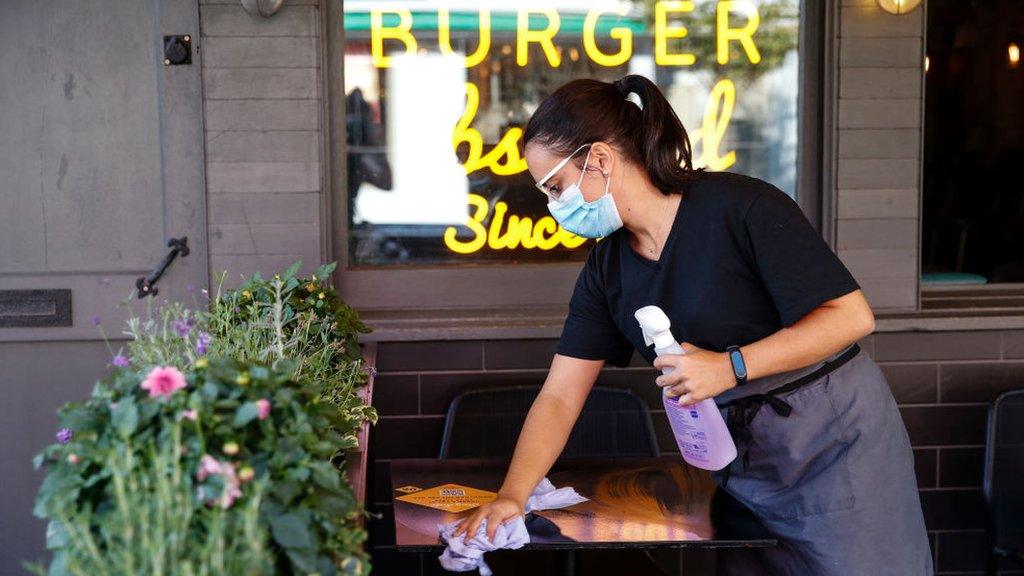Covid in Scotland: Phasing out of furlough scheme 'threatens jobs'
- Published

Scottish business leaders have warned that the winding down of the furlough scheme threatens jobs in sectors which are not yet allowed to fully reopen.
From Thursday, employers will pay 10% of furloughed workers' normal wages.
Contributions will gradually rise until support stops at the end of September.
But business organisations said sectors that had been particularly hard hit by measures to curb the pandemic, such as recreation and tourism, faced turbulent times ahead.
Scottish Chambers of Commerce chief executive Liz Cameron said: "There are major sectors and businesses in Scotland that have not opened their doors for 16 months, and there are many that are not actually seeing any light at the end of this tunnel.
"There is big danger here that the tapering out of this financial support will impact on more jobs being lost in sectors like entertainment, recreation, events, tourism, aviation and travel agents."

What is changing?
From 1 July, employers must pay 10% of their furloughed workers' usual wage, while the government will continue to pay the other 70%.
From 1 August, the employers' contribution rises to 20%, with the government's contribution reducing further.

Stuart Mackinnon, from the Federation of Small Businesses in Scotland, also expressed concern at the winding down of government support for employers' wages.
He said the move had come at a time when banks were asking firms about repayment loans for some of the debt they had taken on during the pandemic.
"The furlough scheme has been so important to many businesses and lots of operators don't need that scheme any more," he said.
"But those firms which can't open their doors at the moment, such as soft play centres and nightclubs, still need that scheme so it is a concern to see that help winding down."

Mr Mackinnon said it would take firms time to pay back money they borrowed through government-backed loaned schemes.
"We need to see flexibility from the banks and innovation from the government when it comes to repaying those debts," he added.
Soft play centre owner Craig Meikle told BBC Scotland he was struggling under an ever-growing burden of debt, having been in a strong financial position before the pandemic.
Mr Meikle, who co-owns the Saltire Centre in Midlothian, said: "We are now over £200,000 pounds in debt.
"We've taken some of the government-backed loans, and we owe about £130,000 to our landlord who has been fantastic throughout the pandemic. Without that, we would be gone by now.
"But that £130,000 we are due our landlord will still have to be paid back in the future."

Many firms are facing mounting debts as they await clearance to reopen their businesses
Mr Meikle is not alone. By the start of this year, Scottish employers had borrowed £3bn from UK government schemes.
Paul Banham, from the Buff Club nightclub in Glasgow, argued that if government support was not available, he must be allowed to trade.
He said: "The entire hospitality sector, whether it is restaurants, bars and especially nightclubs, have had to just do what they can to survive, and with no income, we have all had to turn to different ways of secure funding and generally that's been debt."
The government has spent £66bn on the Coronavirus Job Retention Scheme, as furlough is officially known, and it has supported 11.2 million jobs since March 2020.
However, the number of partially or fully furloughed workers has fallen steeply recently, according to official figures.
The number of furloughed jobs in Scotland fell to 173,100 at the end of May, down from 275,700 in April.
'Furlough needed'
Scotland's Finance Secretary Kate Forbes called on the UK government to extend the furlough scheme beyond its September deadline.
Ms Forbes told BBC Scotland: "Our position is that furlough is needed to support those jobs in sectors where they are still perhaps facing some restrictions and will continue to do so for longer than elsewhere.
"We initially welcomed the extension of furlough, but clearly that support needs to be available for those businesses that need it if we are to save jobs."
She added: "So I think that the furlough scheme should be tailored to the exit of lockdown."
'Generous scheme'
The Treasury insisted the furlough scheme had been very generous and other support, particularly for hospitality, was available until 2022.
A spokesman said: "We deliberately went long with our support to provide certainty to people and businesses over the summer.
"The furlough scheme is in place until September and is amongst the most generous schemes in the world," it added.
Meanwhile, a survey commissioned by national advice service Advice Direct Scotland found that 35% of Scottish workers were worried about the future of their jobs.
The Survation study found concerns were particularly high in the north east, with 42% saying they were "quite worried" or "very worried".
Advice Direct Scotland chief executive Andrew Bartlett said: "The Covid pandemic caused massive economic turmoil, but many jobs have been protected as a result of the furlough scheme or grants.
"With the end of those schemes in sight, it's likely that many workers will be increasingly worried."


- Published1 July 2021

- Published30 September 2021
